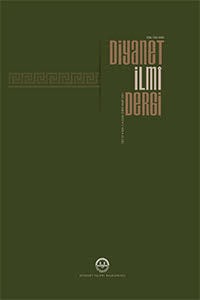Abstract
Keywords
Thanks
Teşekkür ederim.
References
- Açıkgöz, Özcan. "Türk Müslümanlığı". İstanbul: İstanbul Üniversitesi, Sosyal Bilimler Enstitüsü, Yüksek Lisans Tezi, 2000.
- Afif, Yahya. "Lisân-ı Beşer Lisân-ı Kur’ân’a Tercümân Olamaz" Adlı Makale ve Bir Değerlendirme" Namık Kemal Üniversitesi İlahiyat Fakültesi Dergisi 3/1 (2017),102-108.
- Akarsu, Bedia. Dil-Kültür Bağlantısı. İstanbul: Inkılâp Kitabevi, 1998.
- Altınsu, Lütfi. "Ne Yapmak İstedik". Kalem Dergisi 19-24 (1989),18.
- Aydar, Hidayet. Kur’ân’ı Kerîm’in Tercümesi Meselesi. İstanbul: Kur'ân Okulu Yayıncılık, 1996.
- el-Câbirî, Muhammed Âbid. Arap-İslâm Aklının Oluşumu. çev. İbrahim Akbaba. İstanbul: Kitabevi Yayınları, 2000.
- Cündioğlu, Dücane. Anlamın Tarihi. İstanbul: Tibyan Yayınları, 1997.
- Deniz, Gürbüz. Beşer ve Resûl Hz. Muhammed Mekke’de. Ankara: TDV Yayınları, 2020.
- Endelüsî, Ebû Hayyân. Tuhfetü’l-Erîb bimâ fi’l-Kur’ân mine’l-Garîb. thk. Ahmed Matlûb, Hadîce el-Hadîsî. Bağdat: 1977.
- Erbaş, Ali. Hristiyanlıkta Reform ve Protestanlık Tarihi. İstanbul: İnsan Yayınları, 2007.
- Görgün, Tahsin. Anlam ve Yorum. İstanbul: Gelenek Yayıncılık, 2003.
- İbnü’l-Mülakkın. Tefsîr-u garîbi’l-Kur’ân. thk. Semîr Tâhâ el-Meczûb. Beyrut, Âlemü’l-Kütüb, 1987.
- Jeanrond, Werner G. Teolojik Hermenötik. çev. Emir Kuşçu. İstanbul: İz Yayıncılık, 2007.
- Karakaya, Mehmet Murat. Kur'ân’ın Anlaşılmasında Dil Problemi. İstanbul: Marifet Yayınları, 2003.
- Mertoğlu, M. Suat. "Doğrudan Doğruya Kur'ân’dan Alıp İlhamı": Kur'ân’a Dönüş’ten Kur'ân İslâmı’na". Dîvân Dergisi 15/28 (2010),69-113.
- Olgun, Hakan. Sekülerliğin Teolojik Kurgusu Protestanlık. İstanbul: İz Yayıncılık, 2006.
- Öğüt, Salim. "Emir". Tütkiye Diyanet Vakfı İslâm Ansiklopedisi 11/120. İstanbul: TDV Yayınları, 1995.
- Palmer, Richard E. Hermenötik. çev. İbrahim Görener. İstanbul: Anka Yayınları, 2002.
- Suyûtî, Celaleddîn. el-İtkân fî ulûmi’l-Kur’ân. çev. Sakıp Yıldız, H. Avni Çelik. İstanbul: Hikmet Neşriyat, 1987.
- Tekin, Muhammet Ali. "Lisân-ı Beşer Lisân-ı Kur’ân’a Tercümân Olamaz" Adlı Makale ve Bir Değerlendirme". Namık Kemal Üniversitesi İlahiyat Fakültesi Dergisi 3/1 (2017),101-119.
- Zerkeşî, Bedruddîn. el-Burhân fi ulûmi’l-Kur’ân. thk. Dr. Yusuf Abdurrahman, Cemal Hamdi, İbrahim Abdullah el-Kürdî. Beyrut: Dâru’l-Marife, 1994.
- https://www.haber7.com/yasam/haber/136135-abdli-kadin-imampolemige-katildi erişim tarihi:17.06.2020.
Abstract
Each sacred text was sent down in the language of its prophet. The Torah was revealed in Hebrew, the Bible in Aramaic and the Qur’an in Arabic. The addressees of the Holy Books naturally read the texts in their native languages. The issue of reading divine addresses as translation/meaning in languages other than the language in which they were revealed has been more debated in the last few centuries. Especially with the emergence of nation-states, each state has brought its own language to the fore. This also made it necessary for states to translate the Holy Books into their own languages. In our country, the movement of translation of the Holy Qur’an into Turkish started firstly with the effect of cultural and political factors and has continued increasingly in the later processes on the grounds that incorrect and insufficient translations, changes in the language, etc. It is possible for every literate Muslim today to read the translation/meaning of the Qur’an. However, the issue of reading the translation/meaning of the Qur’an contains some problematic issues in itself. This article discusses whether the activity of reading the Qur’an solely from its translation is sufficient in understanding the divine address.
References
- Açıkgöz, Özcan. "Türk Müslümanlığı". İstanbul: İstanbul Üniversitesi, Sosyal Bilimler Enstitüsü, Yüksek Lisans Tezi, 2000.
- Afif, Yahya. "Lisân-ı Beşer Lisân-ı Kur’ân’a Tercümân Olamaz" Adlı Makale ve Bir Değerlendirme" Namık Kemal Üniversitesi İlahiyat Fakültesi Dergisi 3/1 (2017),102-108.
- Akarsu, Bedia. Dil-Kültür Bağlantısı. İstanbul: Inkılâp Kitabevi, 1998.
- Altınsu, Lütfi. "Ne Yapmak İstedik". Kalem Dergisi 19-24 (1989),18.
- Aydar, Hidayet. Kur’ân’ı Kerîm’in Tercümesi Meselesi. İstanbul: Kur'ân Okulu Yayıncılık, 1996.
- el-Câbirî, Muhammed Âbid. Arap-İslâm Aklının Oluşumu. çev. İbrahim Akbaba. İstanbul: Kitabevi Yayınları, 2000.
- Cündioğlu, Dücane. Anlamın Tarihi. İstanbul: Tibyan Yayınları, 1997.
- Deniz, Gürbüz. Beşer ve Resûl Hz. Muhammed Mekke’de. Ankara: TDV Yayınları, 2020.
- Endelüsî, Ebû Hayyân. Tuhfetü’l-Erîb bimâ fi’l-Kur’ân mine’l-Garîb. thk. Ahmed Matlûb, Hadîce el-Hadîsî. Bağdat: 1977.
- Erbaş, Ali. Hristiyanlıkta Reform ve Protestanlık Tarihi. İstanbul: İnsan Yayınları, 2007.
- Görgün, Tahsin. Anlam ve Yorum. İstanbul: Gelenek Yayıncılık, 2003.
- İbnü’l-Mülakkın. Tefsîr-u garîbi’l-Kur’ân. thk. Semîr Tâhâ el-Meczûb. Beyrut, Âlemü’l-Kütüb, 1987.
- Jeanrond, Werner G. Teolojik Hermenötik. çev. Emir Kuşçu. İstanbul: İz Yayıncılık, 2007.
- Karakaya, Mehmet Murat. Kur'ân’ın Anlaşılmasında Dil Problemi. İstanbul: Marifet Yayınları, 2003.
- Mertoğlu, M. Suat. "Doğrudan Doğruya Kur'ân’dan Alıp İlhamı": Kur'ân’a Dönüş’ten Kur'ân İslâmı’na". Dîvân Dergisi 15/28 (2010),69-113.
- Olgun, Hakan. Sekülerliğin Teolojik Kurgusu Protestanlık. İstanbul: İz Yayıncılık, 2006.
- Öğüt, Salim. "Emir". Tütkiye Diyanet Vakfı İslâm Ansiklopedisi 11/120. İstanbul: TDV Yayınları, 1995.
- Palmer, Richard E. Hermenötik. çev. İbrahim Görener. İstanbul: Anka Yayınları, 2002.
- Suyûtî, Celaleddîn. el-İtkân fî ulûmi’l-Kur’ân. çev. Sakıp Yıldız, H. Avni Çelik. İstanbul: Hikmet Neşriyat, 1987.
- Tekin, Muhammet Ali. "Lisân-ı Beşer Lisân-ı Kur’ân’a Tercümân Olamaz" Adlı Makale ve Bir Değerlendirme". Namık Kemal Üniversitesi İlahiyat Fakültesi Dergisi 3/1 (2017),101-119.
- Zerkeşî, Bedruddîn. el-Burhân fi ulûmi’l-Kur’ân. thk. Dr. Yusuf Abdurrahman, Cemal Hamdi, İbrahim Abdullah el-Kürdî. Beyrut: Dâru’l-Marife, 1994.
- https://www.haber7.com/yasam/haber/136135-abdli-kadin-imampolemige-katildi erişim tarihi:17.06.2020.
Details
| Primary Language | Turkish |
|---|---|
| Subjects | Religious Studies |
| Journal Section | Research Article |
| Authors | |
| Publication Date | March 15, 2021 |
| Submission Date | September 25, 2020 |
| Published in Issue | Year 2021 Volume: 57 Issue: 1 |
Diyanet İlmi Dergi is licensed under a Creative Commons Attribution-NonCommercial 4.0 International License (CC BY NC).


